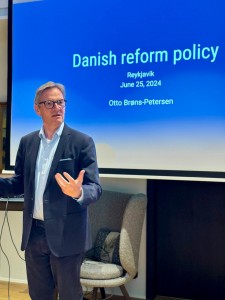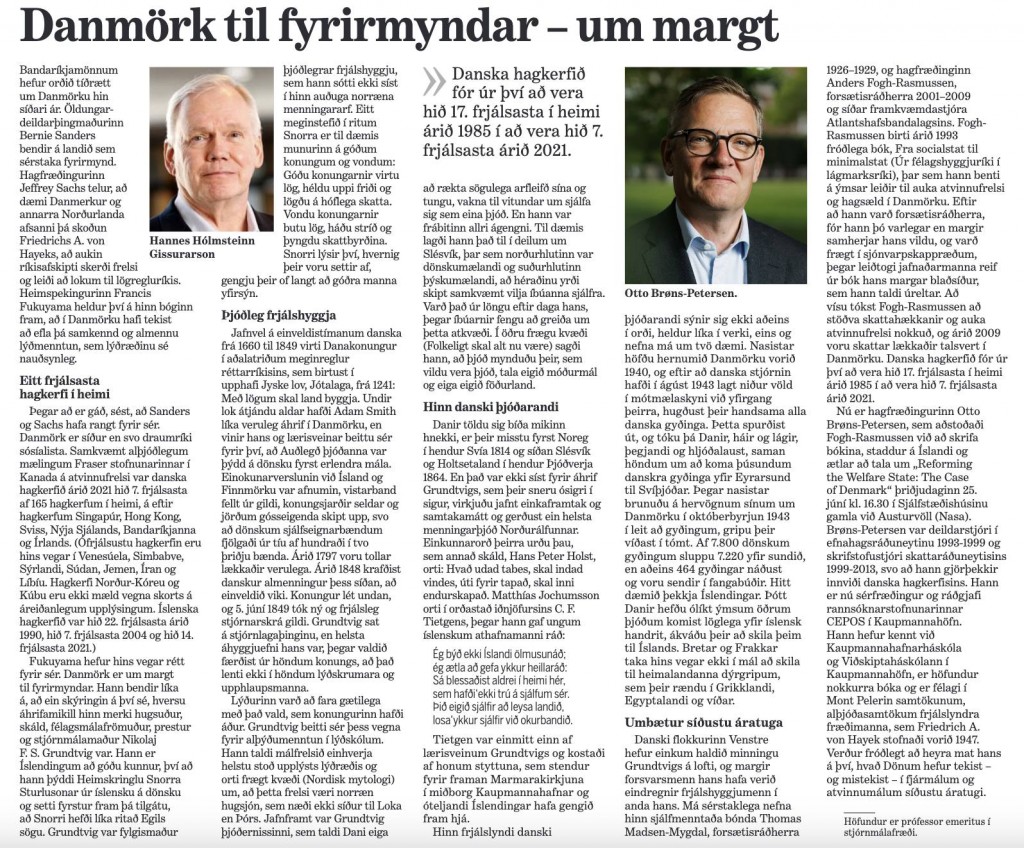 Danish economist Otto Brøns-Petersen, who served as adviser to Danish centre-right governments and was long the deputy permanent secretary in the Ministry of Taxation, gave a talk on 25 June 2024 at a meeting in Reykjavik on the ‘Danish Reform Policy’. He pointed out that Denmark had been quite successful in the last few decades. In 2022, her GDP per capita was the 5th highest in the world, while inflation and unemployment were both low and get government debt had been eliminated. Denmark was not successful because of socialism but despite it. She was a rich country long before the welfare state was introduced, and indeed the introduction of the welfare state created huge economic imbalances that Denmark has had to deal with for decades. Indeed, today the Danish economy is one of the freest in the world according to the Economic Freedom Index published by the Fraser Institute in Vancouver, Canada. Of the Nordic countries, Denmark has the freest economy, and Iceland comes next. Brøns-Petersen described how the Social Democrats had been dominant from the 1930s to the 1970s, where a centre-right government in 1967–1971 had not made much difference. However, in the 1980s there was a widespread feeling that Denmark had gone too far in the direction of socialism. The centre-right Schlüter government in 1982–1992 implemented many necessary reforms, and so did the centre-right Fogh-Rasmussen government in 2001–2009. The exchange rate was fixed; fiscal stability was achieved; the labour market was made more flexible; private pension savings were made possible; rent control was eased; companies were privatised, and utilities were deregulated: the financial sector was deregulated; and tax increases were stopped. These reforms stimulated economic growth, and the Social Democrats did not return to their old ways when they got into power. Nevertheless, many challenges had to be met in the near future, especially high taxes and some re-regulation of the economy under the influence of the European Union.
Danish economist Otto Brøns-Petersen, who served as adviser to Danish centre-right governments and was long the deputy permanent secretary in the Ministry of Taxation, gave a talk on 25 June 2024 at a meeting in Reykjavik on the ‘Danish Reform Policy’. He pointed out that Denmark had been quite successful in the last few decades. In 2022, her GDP per capita was the 5th highest in the world, while inflation and unemployment were both low and get government debt had been eliminated. Denmark was not successful because of socialism but despite it. She was a rich country long before the welfare state was introduced, and indeed the introduction of the welfare state created huge economic imbalances that Denmark has had to deal with for decades. Indeed, today the Danish economy is one of the freest in the world according to the Economic Freedom Index published by the Fraser Institute in Vancouver, Canada. Of the Nordic countries, Denmark has the freest economy, and Iceland comes next. Brøns-Petersen described how the Social Democrats had been dominant from the 1930s to the 1970s, where a centre-right government in 1967–1971 had not made much difference. However, in the 1980s there was a widespread feeling that Denmark had gone too far in the direction of socialism. The centre-right Schlüter government in 1982–1992 implemented many necessary reforms, and so did the centre-right Fogh-Rasmussen government in 2001–2009. The exchange rate was fixed; fiscal stability was achieved; the labour market was made more flexible; private pension savings were made possible; rent control was eased; companies were privatised, and utilities were deregulated: the financial sector was deregulated; and tax increases were stopped. These reforms stimulated economic growth, and the Social Democrats did not return to their old ways when they got into power. Nevertheless, many challenges had to be met in the near future, especially high taxes and some re-regulation of the economy under the influence of the European Union.
Hannes H. Gissurarson, Professor Emeritus of Politics at the University of Iceland, chaired the meeting, where Brøns-Petersen’s talk was followed by a lively discussion. Hannes wrote an article before the meeting about Denmark as a liberal society, moulded by the national liberal Nikolaj F. S. Grundtvig, a great admirer and translator of Icelandic chronicler Snorri Sturluson:
The meeting with Brøns-Petersen followed the annual meeting of RSE, the Icelandic Research Centre for Social and Economic Affairs, where Halldor Benjamin Thorbergsson, director of a real estate company, was reelected Chairman of the Board. Other members of the Board are Halla Sigrun Mathiesen, finance officer in an Icelandic bank, Einar Sigurdsson, private investor, Birgir Thor Runolfsson, Chairman of the Faculty of Economics at the University of Iceland, and Ragnar Arnason, Professor Emeritus of Fisheries Economics at the University of Iceland.



